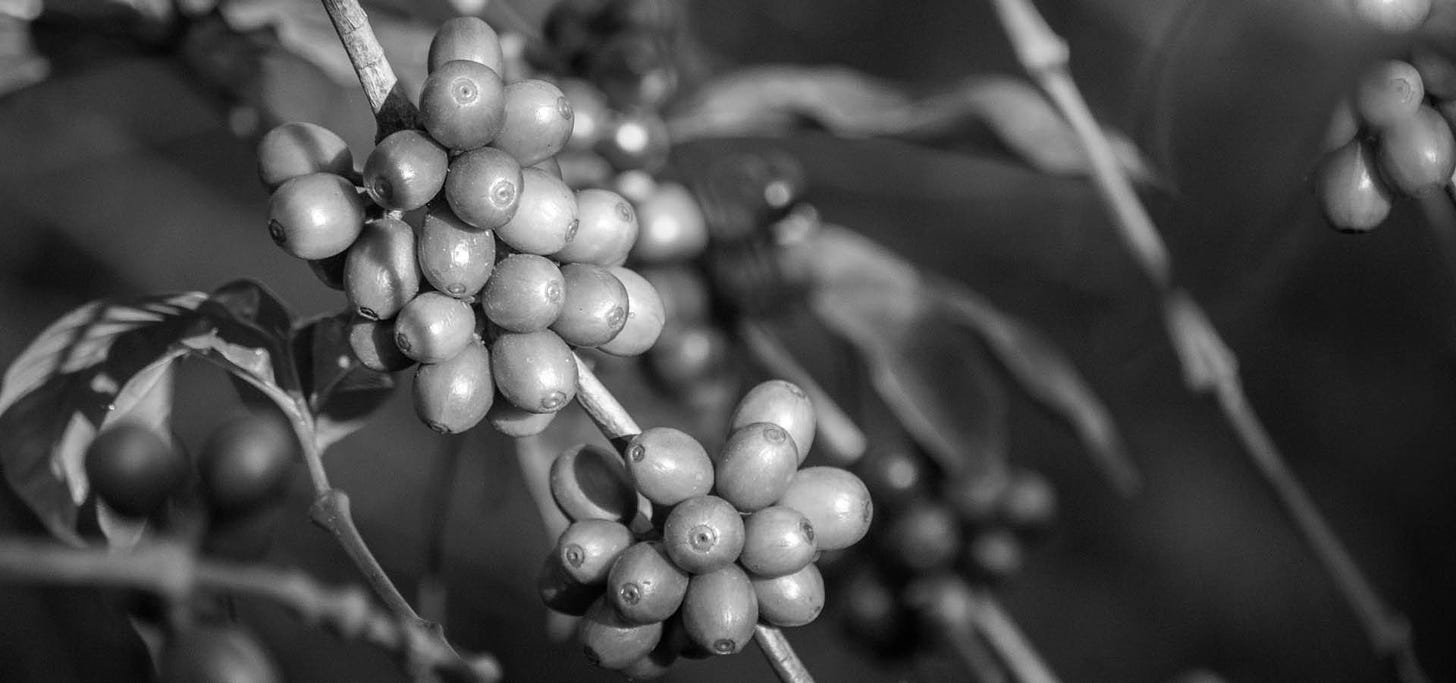Coffee News Roundup: Week Ending October 23rd
Green coffee theft in Kenya; bankruptcy filings in Brooklyn; and a Cleveland-based coffee company is transitioning to a worker-owned model.

This week’s post is a little later than normal, because I had to take a break in order to go to our local orchard for apple cider and donuts.
Now that I’m back and all sugared up, let’s take a look at what’s been going on in the world of coffee, shall we?
Trouble Brewing For Kenya’s Coffee Growers - via Mail & Guardian
A rapidly worsening climate crisis and ongoing global price fluctuations aren’t the only things Kenyan coffee producers need to worry about: they also have to contend with organized green coffee robbery.
So far in 2020, $50,000 worth of green coffee has been stolen from warehouses, according to the Kenyan government, with 18 deaths linked to the coffee smuggling. This has been going on for a while, as well—in 2011, ten people were killed during coffee warehouse robberies.
According to the story, “In most incidents, groups of up to 20 men, armed with guns and machetes, raid the factories or warehouses where the coffee is being stored.” The stolen coffee is then smuggled into neighboring Tanzania or Uganda, where it is blended with local beans to hide its provenance.
Much of the article is concerned with the possibility of collusion between thieves and warehouse officials or local police, with suspicions raised by producer cooperatives, government entities, and the Global Initiative Against Transnational Organized Crime.
And for farmers, there’s no real recourse—Kenyan insurers don’t cover coffee farmers, leaving those robbed with no way to make up for the loss.
Brooklyn Roasting Company Files for Chapter 11 Bankruptcy - via Daily Coffee News
We all know that the COVID-19 pandemic has hit coffee companies particularly hard. Many had to temporarily close in the spring, and the ones that stayed open worked with reduced capacities and reduced customers.
The impact of these temporary lockdown measures is now beginning to be felt more permanently, with companies across the United States closing stores or shutting down for good.
In the case of Brooklyn Roasting Company, a roasting and retail operation with two cafes (down from a high of seven in 2017), this means filing for bankruptcy with the aim of consolidating its activities around its core roasting business.
This trend looks likely to continue, with Pittsburgh, Pennsylvania chain Crazy Mocha also filing for bankruptcy this week. While the pandemic is clearly a big reason for these businesses deciding to file Chapter 11, court filings show that both were losing money before 2020.
It’s also worth noting that filing for Chapter 11 doesn’t actually mean the companies are going bust—it merely allows them to reorganize debts and, in some cases, lay off employees. Neither story linked here mentions workers at any point, so we’ll have to wait and see.

More Headlines
Must-Watch Video: COVID-19 Safety for Coffee Shops
First-time Participants Dominate Colombia Cup of Excellence
The Week In Coffee Unionizing
Not exactly a unionization story, but close: Phoenix Coffee, a Cleveland-based company with five cafes and a roastery, is transitioning to a worker-owned model with help from a local nonprofit that specializes in such conversions.
The company employs 37 people across its various locations, and they will now have an ownership stake and a voice in operating strategy.
The Week In Corporate Coffeewashing
Tim Hortons, everyone’s favorite Canadian road trip stop-off, coming in strong this week with two much-publicized sustainability drives. First, they’re trialing a cup deposit scheme in collaboration with TerraCycle’s Loop initiative, “in select Toronto locations” starting in 2021. Much like other such programs, the idea is for customers to pay a deposit on their cup then return it for cleaning and reusing.
Meanwhile, in a story that sounds like it’s from 2005, Tim will also be ditching the “double cup” practice whereby hot drinks are placed inside a second cup to insulate them, which the company says will save “hundreds of millions of cups from landfills each year.” Customers will instead be encouraged to accept a revolutionary new invention, the cardboard sleeve.
Unbelievably, this double cupping nonsense was still a standard practice among many big coffee chains until very recently—Dunkin only just announced its phaseout of the policy last year.
Have either of these multi-billion-dollar companies not heard of double-walled coffee cups? Pretty sure they’re quite popular.
Is Coffee Good For You?
Drinking coffee or green tea every day might provide a lower risk of death for people with type 2 diabetes, according to a new study.
The research by scientists in Japan, published in the online journal BMJ Open Diabetes Research & Care, found that drinking two or more cups of coffee and four or more cups of green tea was associated with a 63% lower all-cause mortality.
There are, of course, caveats. “This is an observational study, and as such, can't establish cause” says the report in Science Daily. “And the researchers point to several caveats, including the reliance on subjective assessments of the quantities of green tea and coffee drunk.”
Also, once again, what exactly constitutes “a cup” is not explained.
What I’m Drinking This Week
Moving on to the Solstice Blend from Circadian Coffee, one of my favorite new roaster discoveries.
What To Read
How Climate Change May Already Be Affecting Brazil’s 2021 Crop by Jonas Ferraresso
The New Normal Of Café Reopenings: New York City by Tommy McLarney
Until next week, drink good coffee. Support your local cafe (with takeout). And please, wear your mask.




